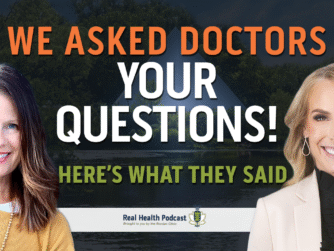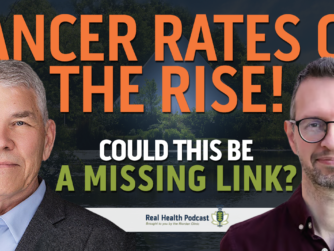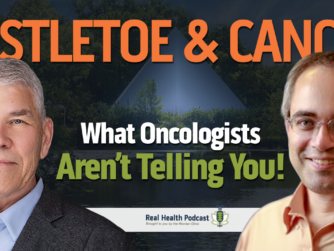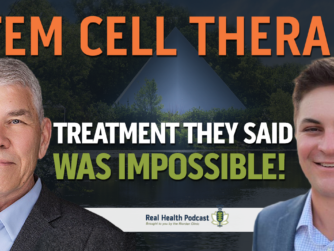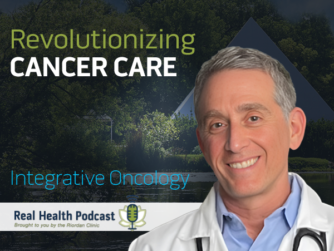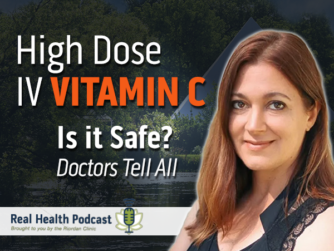In this episode of the Real Health Podcast, Dr. Ron Hunninghake, MD, welcomes Dr. Stephanie Seneff, PhD, of Massachusetts Institute of Technology to discuss the health and environmental dangers of the common weed killer glyphosate. Dr. Seneff discusses her new book “The Toxic Legacy: How Glyphosate is Destroying Our Health and Environment.” She also discusses some health conditions possibly linked to the chemical and ways to potentially reduce exposure.
Thank You To This Episode’s Sponsor
Riordan Clinic Nutrient Store
Watch the Podcast
Episode Transcript
Disclaimer: The information contained on the Real Health Podcast and the resources mentioned are for educational purposes only. They are not intended as, and shall not be understood or construed as medical or health advice. The information contained on this podcast is not a substitute for medical or health advice from a professional who is aware of the facts and circumstances of your individual situation. Information provided by hosts and guests on the Real Health Podcast or the use of any products or services mentioned does not create a practitioner patient relationship between you and any persons affiliated with this podcast. This is the Real Health Podcast brought to you by Riordan Clinic. Our mission is to bring you the latest information and top experts in functional and integrative medicine to help you make informed decisions on your path to real health.
Intro: This is the Real Health Podcast, brought to you by Riordan Clinic. Our mission is to bring you the latest information and top experts in functional and integrative medicine to help you make informed decisions on your path to real health.
Dr. Ron Hunninghake: Well, welcome again, everyone to the Real Health Podcast here at Riordan Clinic. I’m Dr. Ron Hunninghake your host, and it’s my great pleasure today to have on our show Dr. Stephanie Seneff, who has written a wonderful book, “The Toxic Legacy: How the Weed Killer Glyphosate is Destroying Our Health and the Environment.” I’m going to refer to her as Dr. Stephanie. So, Dr. Stephanie, thank you so much for being on our podcast.
Dr. Stephanie Seneff: Thank you so much for having me. And here’s my book, I can hold it up.
Dr. Ron Hunninghake: Yes.
Dr. Stephanie Seneff: “Toxic Legacy.” So that’s what it looks like and paperback coming out soon.
Dr. Ron Hunninghake: I read about three chapters just in the last couple days, and I just want to mention how clear she writes, and it’s just wonderful to … You take us through some pretty tough science, but I think it comes across very clear. How did you get interested in the whole glyphosate story?
Dr. Stephanie Seneff: It really goes back to autism. I was watching the autism rates going up year by year in the early 2000s, 2007, 2008. Again, the autism rates went up. “Yeah, we’re just diagnosing it more.” I didn’t think so. I thought there’s got to be something in the environment that’s causing this rise in autism. And I was determined to figure out what it was. And I started going through all the different chemicals that we were aware of and examining them one by one and looking for correlations to start with. I mean, I’m a computer scientist so I can crunch numbers. And I was kind of coming up short. I was reading about autism and I knew there was a lot of problems, gut problems were critical issue for the autistic kids, many food sensitivities and inflammation in the gut and bloating, all kinds of gut discomfort. So I thought it was something they were eating, there was something in the food.
Dr. Stephanie Seneff: I was thinking along those lines. And I thought maybe antibiotics were messing up the gut microbes, but I happened to be at a lecture, I happened to be at a conference with Professor Don Huber – over 80 years old, he’s still active. He’s an expert on glyphosate, probably maybe the world’s expert on glyphosate. And he was really sounding the alarm in a two hour presentation that I had the pleasure to hear. I was on the edge of my seat. I mean, it made so much sense everything he was saying that glyphosate causes were things that I knew autistic kids suffered from. And I thought this is a home run. And I just walked away from that lecture and dropped everything I was doing and just focused on glyphosate. And I’m still there, so that was in 2012. So that was a decade ago. It’s a really fascinating chemical. I love biology. The glyphosate is a train wreck for biology in so many ways. It’s so fascinating-
Dr. Ron Hunninghake: Absolutely.
Dr. Stephanie Seneff: How it works and terrifying.
Dr. Ron Hunninghake: Well, isn’t it an antibiotic?
Dr. Stephanie Seneff: It is.
Dr. Ron Hunninghake: Yeah.
Dr. Stephanie Seneff: Yes.
Dr. Ron Hunninghake: And so what we’re finding out now in our practice in functional medicine, that the gut microbiome is sacred and when that gets messed up, then you get into all kinds of problems with autoimmune disease, you get detoxification problems, cloudy thinking, and then you get into just a whole spectrum of illnesses. My wife is a second grade teacher and she says every day her little second graders complain about stomach aches and then they fall asleep. And then a lot of them are put on something to wake them back up again.
Dr. Stephanie Seneff: Oh, boy.
Dr. Ron Hunninghake: So she has seen it deteriorate over her 26 years of teaching. And those are just “normal kids.” And it’s not just children. Obviously, we see a lot of people with allergies, autoimmune problems. Can you maybe talk to our audience a little bit about how this disruption of the gut biome translates into such a wide spectrum of illnesses?
Dr. Stephanie Seneff: Right. It’s interesting, isn’t it? And they really didn’t realize how important the gut was until it stopped working. And then now there’s tons of papers coming out about the gut microbiome and how it’s affecting our health and even linking it to Parkinson’s disease and rheumatoid arthritis, all these things go back to gut problems. And as I said, that was what I noticed with the autistic kids. A lot of bloating, a lot of them had celiac issues, gluten intolerance, casein intolerance. They couldn’t handle dairy. They had many food sensitivities, a lot of the autistic kids do. And I think it’s because glyphosate’s messing up the gut microbiome. I think that’s central to glyphosate’s toxicity. And they said, it’s such a wonderful chemical because it messes up an enzyme in the plants. It’s crucial for the plants, but human cells don’t have that enzyme. So, yay, yay.
Dr. Stephanie Seneff: We’re not sensitive to glyphosate because we don’t have the enzyme. It’s a good story. The problem is our gut microbes not only have that enzyme, but they use it to make essential nutrients for us. And of course they also make other essential nutrients. So the microbes are going to get sick if they’re exposed to glyphosate because they don’t have that enzyme and they’re not going to be able to supply those critical nutrients. And in particular, it’s called the shikimate pathway that glyphosate disrupts and the product of the shikimate pathway is the three aromatic amino acids – tryptophan, tyrosine, and phenylalanine those three amino acids – which are the building blocks, they’re three of the 20 building blocks of proteins. Our cells can’t make those aromatic amino acids because they don’t have that pathway. So our gut microbes are supplying us with those essential nutrients.
Dr. Stephanie Seneff: And they’re not only part of the building blocks of proteins, but those are also precursors to an incredible number, a large number of really important biologically active molecules, hormones, and neurotransmitters of the serotonin melatonin. Melatonin is so important. And we have a lot of people who are taking melatonin. Melatonin is actually protective against COVID, we’re finding out. You may have heard that. And we can’t make melatonin if we don’t have the precursor to melatonin, which is one of those aromatic amino acids. Also melanin, the skin tanning agent. So then people say, “Oh, I don’t tan. I burn. I can’t get out in the sun because I don’t tan.” Well, you don’t have melanin because you’ve got a blockage there in the precursor to melanin. And of course serotonin, that’s the happy hormone. I mean the neurotransmitter that is associated with … Deficiencies are associated with violent behavior, depression, obesity, all these issues that we see today in our society.
Dr. Ron Hunninghake: So many people are complaining now that they can’t sleep. And I think it’s tied into this as well. And of course the stress level is very high. People are depressed, they’re moody. They can’t focus as well. So we’re seeing it’s not all the way autism, but it’s like autism on a general scale almost.
Dr. Stephanie Seneff: I think so, yeah. I think there’s actually a thread from autism to schizophrenia to Alzheimer’s. I think all of those are connected to the same issues in the brain. There’s a lot of parallels there.
Dr. Ron Hunninghake: Alzheimer’s is the fastest growing chronic disease, and they’re talking about in the next, by 2050 a tripling.
Dr. Stephanie Seneff: It’s so scary because it’s such a debilitating disease, and there’s an article that just came out on glyphosate. I was so excited to see this July 28th, I think it was published. And this article really hit directly on the issue of glyphosate causing Alzheimer’s. Really interesting. It showed that glyphosate gets passed through the brain barrier that causes inflammation in the brain. It causes amyloid beta to show up the misfolded protein that’s associated with Alzheimer’s. Really direct, very strong evidence. I was really happy to see that because I talked in my book about the perfect correlation, both autism and Alzheimer’s are going up dramatically over time. Exactly in step with the rise in glyphosate usage on core crops. And I think it’s not just a correlation. They say, “Oh, correlation doesn’t mean causation.” They dismiss it. I mean, it’s amazing how they can just ignore the evidence that’s staring them in the face. They just ignore it.
Dr. Ron Hunninghake: So what I really wanted to talk to you about, and I know our audience is interested in your thoughts on this, too, is what we, as the average person, who’s out there trying to fight for our health and our wellbeing. And we know that this is so pervasive in our food and in our environment, you almost can’t get away from it because it’s in the water and everywhere. What’s a person to do? Let’s just of talk a little bit about some ideas about the average person trying to be healthier, dealing with the glyphosate issue.
Dr. Stephanie Seneff: Right. Now it’s all over the food supply and the CDC just recently finally tested they a random sample of a number of people, thousands, over, I forget how many, but maybe a couple thousand people looking at glyphosate in the urine and they found detectable levels in 80% of the people they tested. So it’s pervasive in our food supply. The most important-
Dr. Ron Hunninghake: I tested a lady, I saw her today, and she’s in the 75th percentile-
Dr. Stephanie Seneff: There you go.
Dr. Ron Hunninghake: From the Great Plains Laboratories and she’s tired, but yeah.
Dr. Stephanie Seneff: Yes, yes. And they’ve seen the correlation, too, with fatty liver disease. A paper showed three different groups. I’ve talked about it in my book, the ones who were healthy, the ones who had earlier stage of fatty liver and then the advanced stage statistically significant differences in the level of glyphosate and the urine among those three groups. So that’s really impressive. So one thing you can do is test your urine and see what your situation is as far as whether you should be alarmed. Eating certified organic, I think is the number one thing. And we’re very compulsive about buying only certified organic in my household. And we have really noticed an improvement in our health once we started doing that, which was a long time ago, because as soon as I … Really in that first year, I’m like, okay, we’re pitching everything.
Dr. Stephanie Seneff: We’re just going to get rid of it. Start over, buy new cereal, buy it organic. So eating certified organic number one, I think it’s most important. You need to worry if you live even … Of course, if you live near agricultural fields, that’s a problem. If they’re spraying glyphosate next door, I mean, I think you almost have to move. I don’t think there’s another way around it. You have to move. Don’t live next door to a farm where they’re spraying glyphosate. I think that’s really important.
Dr. Ron Hunninghake: I just had a 12-year-old girl with a sarcoma, a huge sarcoma. And she lives on the edge of town, near a field. And I told you about this last test, which was in the 75th percentile was a 1.8 micrograms per gram. This girl with sarcoma was up to seven micrograms-
Dr. Stephanie Seneff: Wow.
Dr. Ron Hunninghake: And so she developed a sarcoma. So people need to-
Dr. Stephanie Seneff: Yes, there you go.
Dr. Ron Hunninghake: What we’re saying, this needs to be taken seriously. So yeah.
Dr. Stephanie Seneff: That’s right. The Non-Hodgkin’s lymphoma, you probably know about all the lawsuits, because it really started off with one Non-Hodgkin’s lymphoma. He was using glyphosate in schoolyards this guy, Lee … Oh, Dewayne Lee Johnson. Dewayne Lee Johnson. Yes. He got a big award, and then two more cases followed. They also got huge awards from jury trials. The awards got cut back by further negotiations, but they all succeeded in getting, I believe they’ve all succeeded in getting money from Bayer. Bayer has bought Monsanto. Monsanto was the original. And so now there’s tens of thousands of cases waiting in the wings. And they’re trying so hard to do some kind of class action lawsuit that includes a clause that says no more, nobody else can sue after this and they’re not letting them get by with that.
Dr. Ron Hunninghake: I don’t think so.
Dr. Stephanie Seneff: They’re still facing a real challenge with glyphosate. In fact, they’ve decided Bayer has decided to stop selling RoundUp to the U.S. population, the residential population. They’re still going to use it on the food, which is really, really unfortunate, but they’re going to stop selling it to the residential population because that’s where the lawsuits are coming from. The farmers can’t really sue because they are exposed to so many chemicals. They can always point the finger at the other chemical. So it’s hard for the farmers to prove it. But the farmers do have an increased risk of Parkinson’s disease and Alzheimer’s, of course Non-Hodgkin’s lymphoma. All these things have been shown statistically that these farmers suffer from these things.
Dr. Ron Hunninghake: It used to be the farmers were the healthy people.
Dr. Stephanie Seneff: I know.
Dr. Ron Hunninghake: They live into their 90s.
Dr. Stephanie Seneff: It’s so sad because it is a healthy job. You’re out in the sunlight. You’re getting exercise, if you weren’t poisoning yourself, and that’s the whole issue. People don’t realize how much the poisons matter. And they talk about the food and they talk about the processed food. It’s true. It’s very nutritionally … It’s not nutritionally dense, the processed foods. That’s the other thing is eat whole foods. Number one, eat certified organic; number two, eat whole foods, really important to eat a lot of veggies and I’m not vegan or anything. I like meat, I think seafood is fantastic and eggs, organic eggs are one of the healthiest and cheapest things you can get as far as nutritional value.
Dr. Ron Hunninghake: Absolutely.
Dr. Stephanie Seneff: Because that egg yolk-
Dr. Ron Hunninghake: Agree.
Dr. Stephanie Seneff: Has so much nutrition – and fish and oysters. Oysters are an incredible source of a lot of minerals and healthy fats. So I know seafood is expensive, and some people don’t live near the coast. Many people don’t live near the coast, but if you do, that’s a great option.
Advertisement: There’s a lot more to this conversation and it’s coming up right after a quick break. Today’s podcast is brought to you by Bio-Center Laboratories. The Bio-Center laboratory provides state of the art lab testing and diagnostic services for healthcare providers, laboratories, hospitals, and the general public. Lab tests available through Bio-Center include a comprehensive list of vitamins, minerals, fatty acids, amino acids, hormones, and pyrroles. We also provide a variety of standardized tests for disease markers. These markers include cardiovascular disease, diabetes, thyroid dysfunction, hormone imbalance and more. Visit BioCenterlab.org to learn more.
Dr. Ron Hunninghake: We measure glutathione. We measure the methylation pathway. We try to help people activate their detoxification pathways. That’s one way, are you aware of other things that people can do to help get glyphosate out of their system once it’s there?
Dr. Stephanie Seneff: And I do want to mention the glutathione and also N-acetyl cysteine, which is precursor to glutathione. And glycine, glycine is a nutrient that you can supplement. I like bone broth, bone broth is a good source of glycine, organic bone broth. Make sure it’s not … Because you’re going to have glyphosate. If there’s glycine, that’s going to be glyphosate if it’s not organic. So worry about that. Buying organic supplements glycine and cysteine are both important for glutathione. Those are two of the three amino acids that go into glutathione and glutathione is an incredibly important antioxidant in the liver that glyphosate suppresses. I mean, I wrote about it in my book, but it messes up glutathione big time. So you really need to make sure that there’s enough of that. And that also means eating sulfur-containing foods. I really emphasize that, a high sulfur diet. And again, that goes back to the seafood and the organic eggs. Those are really good sources of sulfur, cruciferous vegetables. I love garlic, garlic and onions, eat tons of those. They’re really nutritious and spice up your food a bit.
Dr. Ron Hunninghake: And they’re known one to be good detoxifying foods.
Dr. Stephanie Seneff: Exactly, that’s a critical thing.
Dr. Ron Hunninghake: All of our cancer patients, we say, “Hey, get on your greens and your cruciferous.” Yeah.
Dr. Stephanie Seneff: There you go. And that’s really for the sulfur I think, but they also have some interesting in molecules in there that are helpful for metabolism. But I think the sulfur is super important. Sulfur is crucial for being able to … And people don’t realize this, but sulfate plays an important role in the clearance of a broken molecules. You get oxidation damage and you have to clear those things that are oxidized, because they’re not useful to you anymore. You need to break them down and into basic molecules that can be built back into healthy molecules. There’s a constant process of breaking down things that got oxidized or things that got glycated. And the process that does that in the lysosome depends upon sulfate and sulfate is going to be sulfur. So you really need to make sure to get enough sulfur in your diet. That’s very important.
Dr. Stephanie Seneff: And the other thing I say is sunlight exposure. I really believe in the sun. Get out in the sun without sunscreen, without sunglasses. I mean I’m a case in hand because I have never used sunglasses all my whole life and I love the sun. I’m outside all the time with the sun shining in my eyes and I’m 74 years old. I don’t have any issues with my eyes. I don’t even wear glasses. I mean, that’s quite amazing, isn’t it?
Dr. Ron Hunninghake: In your same boat. I’m in your same boat.
Dr. Stephanie Seneff: They tell you to-
Dr. Ron Hunninghake: Same thing. I have never… Well, I wore glasses in high school, but then I got rid of them after medical school. And I haven’t worn them since.
Dr. Stephanie Seneff: Yes. I mean I don’t have perfect vision and I did the same thing. I sort of started taking my glasses off when I was outside because I wanted that sun, it felt so good. And then I started just kind of leaving my glasses off, so I don’t have perfect vision, but I can drive without my glasses. So I’ve basically forgotten that I have glasses. I don’t have to see the blackboard as a child in school, I’m okay.
Dr. Ron Hunninghake: Well it’s a shame that the sunshine has gotten so demonized by-
Dr. Stephanie Seneff: I know.
Dr. Ron Hunninghake: Dermatologists, because we absolutely … It’s a nutrient so to speak-
Dr. Stephanie Seneff: It totally is.
Dr. Ron Hunninghake: Everyone should have, it’ll make you feel better. It’ll reduce your risk for chronic illness. It boosts your vitamin D levels, which is really, really important. And so all that and plus it just feels good to be in the sun.
Dr. Stephanie Seneff: It does. And I write about it in my book because it’s more than vitamin D. The dermatologist will say, “Stay out of the sun and take vitamin D supplement.” That’s what they’ll tell you. It’s the wrong advice, in my opinion. I think you need to get the vitamin D from the sun and because you’re not just getting vitamin D. People think of it as just a magic pill. But vitamin D is about more than vitamin D when it comes to sunlight, and people don’t realize that. And then of course there are things that can detox and a lot of people are fond of a product called ION Biome. It was designed by Zach Bush. He’s a friend of mine.
Dr. Ron Hunninghake: I know Zach.
Dr. Stephanie Seneff: He’s talked a lot about glyphosate, and he’s done studies. He actually has peer reviewed published papers that show that glyphosate increases inulin the gut, which causes a leaky gut-
Dr. Ron Hunninghake: Leaky gut.
Dr. Stephanie Seneff: Which causes a lot issues. And he has made this formulation and it’s based on really healthy soil. They take out these folic acid and humic acid, which are these complex organic molecules in the soil. And apparently, I read about it and wrote about it in my book, it was quite fascinating what I found was that they’re actually enzymes that get bounded to those folic acids that are made by the microbes, these enzymes and the enzymes are very versatile. They can break down lots of toxic chemicals. They have a very powerful ability to break things down. And so one of the things they can break down is glyphosate so it could be that you’re actually taking enzymes that can break down glyphosate when you take folic acid and you also has some minerals in there and some spores, I think of some microbes that can help replenish your gut microbiome. so I think that’s a good product and that’s representative-
Dr. Ron Hunninghake: We have it in our store. We have it in our store.
Dr. Stephanie Seneff: Excellent. And there are other things of that sort that you can buy. You can just buy the folic acid for example, and you can take minerals. And of course minerals would also be sea salt. Use sea salt instead of regular table salt so that you’re getting all the minerals instead of just the sodium chloride. So those are some simple things you can do that are not hard and that are harmless. They’re not going to cause side effects. The things that I’m suggesting are not going to cause side effects. So it’s not like taking a drug. And another one is apple cider vinegar. I’ve been claiming, and I don’t know if it’s true, that you can break down … Again, apple cider vinegar contains acetobacter. That’s true, it contains the microbe called acetobacter, and there are members of that family that can break down glyphosate, enzymatically. Glyphosate’s a tough molecule to break down and most of the microbes can’t do it.
Dr. Stephanie Seneff: And the ones that can get an advantage, pseudomonas aeruginosa’s another one that can break down glyphosate. And I think that’s why we have a huge problem with pseudomonas in our hospitals. There’s a lot of trouble with it being a runaway infection that you can’t treat it with antibiotics. It has an advantage because it can break down the glyphosate and actually use it as a source of phosphorous. And the same thing with cyanobacteria. We have a lot of issues with the red tide and the blue green algae, all this mess in the waterways in Florida and also in the Great Lakes. I think glyphosate’s a major contributor to that. And I think the reason is because the cyanobacteria, they actually break down the glyphosate, but then they release nitrogen. They deliver nitrogen to the algae and the algae overgrow and you get the red tide. So there’s a real mess that goes on. But the blue green algae thrive because they’re performing a service of removing the glyphosate from the waterways. Quite interesting.
Dr. Ron Hunninghake: We talked to our patients about the small chain fatty acids in the colon and butyrate.
Dr. Stephanie Seneff: That’s a big one.
Dr. Ron Hunninghake: And there are some new products coming out. There’s one called Tributyrin where they attach it, the three butyrates to a glycerin molecule and it gets-
Dr. Stephanie Seneff: Interesting.
Dr. Ron Hunninghake: Down to the colon a little bit better. So it’s a really good way of-
Dr. Stephanie Seneff: That’s really interesting.
Dr. Ron Hunninghake: Repopulating and helping your body detoxify stuff in that area.
Dr. Stephanie Seneff: That’s a very important point. In fact, I don’t know if you read my gut chapter, you maybe haven’t gotten to that chapter yet. You’ll enjoy it because it talks about the butyrate. Have you read that chapter? I think it’s-
Dr. Ron Hunninghake: That’s why I wanted to talk to you about it.
Dr. Stephanie Seneff: Yeah. So that’s really interesting. I spent a long time studying for that chapter. That was a hard one because the gut-
Dr. Ron Hunninghake: It’s complex.
Dr. Stephanie Seneff: Papers are really tough, but I finally worked it out. I was really quite proud of myself because it’s quite interesting. And it’s just been shown experimentally that glyphosate reduces the level of acetate in the gut and that glyphosate increases the pH of the gut. And I think it does this because of its problems with proteins that I talk about in the book. It ends up the proteins don’t get broken down in the mid gut and then the amino acids can’t be absorbed.
Dr. Stephanie Seneff: Basically you have these long chains of proteins, you break them down into individual amino acids, they get absorbed in the mid gut, and then they supply you with amino acids. That doesn’t happen. So the whole peptide sticks around, goes into the colon, and then the colon gut microbes break it down all the way, not just to amino acid, but to nitrogen. And the nitrogen becomes ammonia and ammonia raises the pH of the gut and now it’s too high. And those acid loving microbes can’t make acetate and butyrate so acetate goes down, the butyrate goes down, and your colonocytes love butyrate, that’s their favorite fuel. They really thrive on it.
Dr. Ron Hunninghake: They need that, yeah.
Dr. Stephanie Seneff: They don’t have enough and then they get sick and then you’ve got all kinds of –
Dr. Ron Hunninghake: Course we’re seeing a rising incidence of colon cancer in young adults. And so part of this probably is the whole story that we’re talking about today.
Dr. Stephanie Seneff: Yeah. And these Crohn’s disease and inflammatory bowel disease, those are going up directly exactly-
Dr. Ron Hunninghake: Irritable bowel.
Dr. Stephanie Seneff: In step with the rise in glyphosate usage, perfect match, the correlation. So it’s so clear to me. I don’t understand why people don’t just see it, and we’ve been told it’s healthy. Don’t worry about it. It’s a great resource for killing the weeds. It makes your food cheap and the government just refuses to acknowledge that it’s poisoning everybody. I think it’s a major contributor to the problems we’re having with COVID-19. I really have to say that.
Dr. Ron Hunninghake: I agree.
Dr. Stephanie Seneff: Glyphosate is messing up the lungs and making you unable… Messing up the immune system. I have a chapter in my book on the immune system and causing you to not be able to clear the virus.
Dr. Ron Hunninghake: So hopefully our listeners after today’s presentation will pick up a copy of your book and just thumb through it and find the stuff that relates to your own condition and start to learn about this so we can be a better consumer. And because one of the ways we change is with how we use our pocketbooks. And if we can start buying more organic and buy the types of foods that are going to protect us, we’re going to be challenging these huge corporations, but it takes people like yourself and like our listeners who are willing to go the extra mile to take better care of their health.
Dr. Stephanie Seneff: And the farmers will thank you for it too.
Dr. Ron Hunninghake: They will.
Dr. Stephanie Seneff: Because if they grow organic, they’ll be healthier-
Dr. Ron Hunninghake: Dr. Stephanie-
Dr. Stephanie Seneff: Once they figure out.
Dr. Ron Hunninghake: I wish we could just keep going. I think we could just talk a day, but thank you so much for your work and for getting this word out and making people aware that this is an invisible threat that’s affecting so many aspects of our lives and we as individuals need to take better care of ourselves because we can’t wait for the government to do it for us.
Dr. Stephanie Seneff: Absolutely good point. Yes. It’s unfortunate. The government needs to change, but in the meantime, we can do it ourselves.
Dr. Ron Hunninghake: We have a voice and we can make better choices. So once again, thank you for your work and all that you’re doing. And for the clear exposition you’ve made in the Toxic Legacy. So-
Dr. Stephanie Seneff: Thank you.
Dr. Ron Hunninghake: Hope all is well with you in the future.
Dr. Stephanie Seneff: Thank you so much. Great to talk to you.
Dr. Ron Hunninghake: Bye now.
Dr. Stephanie Seneff: Bye now.
Outro: Thank you for listening to the Real Health Podcast. If you enjoy this episode, be sure to subscribe and leave us a review. You can also find all of the episodes and show notes over at RealHealthpodcast.org. Also be sure to visit RiordanClinic.org, where you will find hundreds of videos and articles to help you create your own version of real health.


